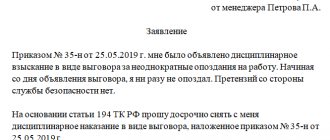Employees performing work functions may deliberately make mistakes and violations, which can cause harm to the company and its reputation. To avoid such violations, the legislator has provided for the possibility of punishing employees.
This procedure is regulated by labor legislation and has a clear sequence of actions that are the basis for imposing a penalty. Violation of this procedure may be grounds for appealing an order to impose disciplinary sanctions.
About current disciplinary measures
types of disciplinary sanctions against its subordinates :
| View | Description |
| Comment | The easiest form of labor responsibility. Must be in writing. The employee is also made aware of such punishment in writing. Usually does not affect the level of material incentives for the employee in the future. |
| Rebuke | The most common type of disciplinary liability. An employee who has received a reprimand does not have the right to be rewarded by the employer for the entire period of this reprimand. All premiums, bonuses, certain types of additional payments and allowances are removed from him. |
| Dismissal | It is considered the most severe type of punishment for disciplinary violations. Typically applied to employees. Who have previously been brought to justice and received penalties such as reprimands. Can be applied to citizens who have committed a serious violation (theft of property, showing up at work drunk, absenteeism without any good reason). |
Special legislation may provide for other types of punishment applied to negligent employees. The procedure for bringing a person to disciplinary liability involves a comprehensive study of the circumstances of the case, the severity and consistency of the offense.
In some cases, consideration of such offenses is carried out with the participation of representatives of the trade union of which the employee is a member. For the order to be legitimate, the trade union must agree with the employer’s arguments and give its approval to bring the employee to justice.
Remember, a penalty announced to an employee must be formalized by order of the employer, have clear wording, a link to the document (instruction) that was previously violated, as well as the type of penalty applied.
Disciplinary action. For information on changes from August 14, 2018, watch this video:
What is stated in the act
If an employee does not want to sign or, in principle, does not intend to get acquainted with the contents of the order, notification, instruction, order or instruction, then a special paper is drawn up about this. It should contain:
- Full name and position of the employee who refuses to familiarize himself with the order (or put his signature on the documents);
- Full name of the person drawing up the document (often this is a personnel department employee, accountant or other official responsible for familiarizing employees with orders);
- positions, surnames, first names and patronymics of employees who will attest to the fact of categorical refusal (at least three people);
- place and date of compilation;
- name of company;
- if possible, exact time;
- number and date of the document due to which the dispute occurred;
- personal signatures of the persons who witnessed the act.
Also in the above form there are several blank lines to explain the motivation of the employee who refused. If the reasons were not given, then a dash is placed in these columns. If they were expressed at least orally, then these justifications can be written down by the document compiler who heard them.
If the employee has read the provided paper, but has not put the required reading mark, this act is also drawn up.
Deadlines for imposing a penalty and familiarizing the employee with the order
Once a violation has been identified, the employer has a certain period to sort everything out and make a decision to bring the perpetrators to disciplinary action. Depending on the circumstances, the period for imposing a penalty should not exceed:
| Term | In which case |
| One month | In all cases where the culprits are at work. It is possible to perform a full internal investigation or audit. |
| Six months | If the worker who committed the violation is not at work (illness, long business trip, vacation). |
| Two years | If the fact of violation was discovered by an audit of economic activities. It is counted from the day the offense was committed, not its discovery. |
It should be taken into account that if, for reasons beyond the control of the employer (for example, the union deliberately delays the consideration of the administration’s appeal), the deadline for making a decision is postponed, this is not a gross violation.
Employee "in the house"
Sometimes an employee is not ready to accept unpleasant news, and personnel officers almost have to run after him to convince him to sign. Employees do not always understand that the absence of a signature will not change the employer’s intentions.
In different situations, we can take the position of a Child, Parent or Adult. Often, when a person does not know what to do, when there are no adult behavior skills or resources to solve the problem, he uses strategies that gave successful results in childhood. The “I’m in the house” position, that is, ignoring the problem, is a variant of this strategy. A person, on the one hand, understands that dismissal is inevitable, and on the other hand, he includes his inner Child,” social teacher and psychologist Tatyana Khodzhaeva .
We must remember that the relationship between employer and employee is not only about compliance with the law. Much depends on what kind of relationship the manager and HR officer build with the team, and what message they convey about the changes.
You shouldn’t take the same childish position: “I’ll complain to my boss now!” It would also be a mistake to talk from the position of the Parent: “Aren’t you ashamed? You must sign!” In negotiations, take the position of an Adult: argue, rely on legislative norms, voice them to your interlocutor, advises Tatyana Khodzhaeva .
To make an informed decision, the employee must understand the consequences of his refusal and know what steps the employer will take if he does not receive a signature on the order. And you should tell him about this.
Disagreement with a disciplinary order
If, after the announcement of the penalty, the employee does not agree with the decision made by the employer, he must indicate this at the time of familiarization with the order on the penalty. This is done by making an appropriate entry on the employer’s order itself. This can be a short statement “I do not agree with the collection” or a description of the detailed text why the collection is unlawful.
The consequence of disagreement with the order is usually the preparation of an appeal with a request to cancel this decision to one of the following authorities:
- the company's labor dispute commission;
- to the trade union, and through it to the employer;
- labor inspection;
- the prosecutor's office;
- directly to the court.
To appeal a penalty, you will need to obtain from the employer a copy of the order by which it was announced, and support it with copies of documents confirming the innocence of the person held accountable. It can be:
- A copy of the employment contract and job description.
- Copies of regulations, instructions, rules.
- Official, reports, explanatory notes from the materials of the disciplinary case.
- Eyewitness accounts.
It is advisable to attach to the application the maximum possible number of documents, on the basis of which a decision will be made on the legality of bringing the employee to disciplinary liability.
Considering that certain documents may not be provided by the employer, it is advisable to immediately indicate this in the application. In the future, this document will be requested by the body authorized to consider the citizen’s complaint.
An appeal against a disciplinary sanction can be made in person or through a trade union. At the same time, the trade union has the right to take the initiative and file protests or complaints against the employer’s actions in the following cases:
- at the request of one of its members, to whom a penalty was applied;
- on one’s own initiative, if consent to hold the worker accountable was not provided;
- at the request of a citizen who is an employee of the company, but is not a member of the trade union.
Remember, if you were illegally or groundlessly held accountable and you do not agree with this, you should express your disagreement on the order. Otherwise, such a decision may be considered correct, and the employee’s complaint may be left without consideration.
For information on imposing a disciplinary sanction and appealing it, see this story:
How are entries made in the work book if the dismissal was challenged in court?
An entry in the work book about a change in the date or wording of the reason for dismissal is made if the work book is with the employer at the time the resolution of the labor dispute is completed or if the employee, who previously received the work book upon dismissal, provides it to the employer for making an entry.
The work book must:
- record the invalidity of the original dismissal record;
- and make the correct entry. For example: “The entry for number so-and-so is invalid, dismissed (a new date or wording of the reason is indicated).”
In this case, the basis for recording changes in the wording of the reason or date of dismissal will be an order of the employer or a corresponding court decision.
In addition, upon a written application from the employee, he must be issued a duplicate work book without making an entry in it that has been declared invalid.
Rostrud drew attention to this in a report on the prevention of violations in the field of labor legislation for the third quarter of 2020.
More on the topic:
Who will correct mistakes in a new employee’s work record?
How to correct errors in a work book
Time limit for appealing an order to impose a disciplinary sanction
The legislator has clearly defined the time frame within which an employee brought to justice has the opportunity to seek protection of his rights. It all depends on the specific situation, so the deadlines for appealing will vary:
- Month . For cases where a citizen was illegally fired from work. Calculated from the date of signing (reading the signed) order and issuing the work book.
- Three months . Determined to appeal against comments and reprimands. This period is considered from the moment the decision is made and the employee becomes familiar with it.
- One year . Regarding violations related to late or incomplete payment of wages.
It is important to indicate that if the deadline established by law was not met for valid reasons, it can be restored. But this will need to be written about in a complaint or lawsuit. Typically, if the missed deadlines were due to the fault of the administration, the beginning of the calculation of the appeal period will be considered the date when the employee became aware of the violation of his rights.
Typically, complaints are reviewed by authorized authorities no later than a month from the date of registration of the complaint. The complaint must be made in writing and officially recorded.
If, after contacting the labor inspectorate or the prosecutor's office, the citizen remains dissatisfied with their decision and wants to go to court, the calculation of the deadlines begins from the day he receives a refusal from the organization that considered his complaint.
Remember, missing the deadlines set by the legislator for considering complaints and claims can become a formal reason for refusing to consider the appeal, even if the citizen is actually brought to justice unlawfully.
Signature - right or obligation
Documents are of great importance in the relationship between employer and employee: with the help of orders and statements, the parties record oral agreements or inform each other of their intentions.
The most common reasons for placing an order:
- vacation;
- hiring and firing;
- transfer to another position or job;
- purpose of recovery;
- attraction to overtime work, etc.
The auto-fill mechanism will reduce the time for preparing orders
The personnel department must familiarize the employee with each of the orders against signature. At the same time, the Labor Code does not oblige the employee to sign all orders (Article 21 of the Labor Code of the Russian Federation). Art. 379 of the Labor Code of the Russian Federation directly states that in some cases an employee has the right to refuse to perform work.
Grounds for appeal
Today there is no single approved list of grounds for appealing disciplinary sanctions.
At the same time, the generalized judicial practice of considering such cases has identified the most common reasons for appeal:
- the level of punishment does not correspond to the severity of the offense committed by the employee;
- there was a violation of the procedure for considering an offense in terms of determining a clear relationship between the actual actions of the offender, the requirements of the work technology, as well as the requirements of his job description;
- during the consideration of the violation, it was not determined whether there was intent in the employee’s actions or whether the situation arose accidentally (due to the actions of production factors beyond the control of the subordinate);
- during the internal investigation, the employer’s commission did not fully study the circumstances of the case, did not take into account the behavior of other colleagues of the alleged culprit, as well as the situation that arose at the time of the offense;
- the legal right of a citizen to refuse to perform work not provided for by his official duties was ignored;
- the employee’s past merits, the availability of incentives, the absence of penalties for past periods of work, health status, and other positive factors that make it possible to reduce the penalty are not taken into account.









